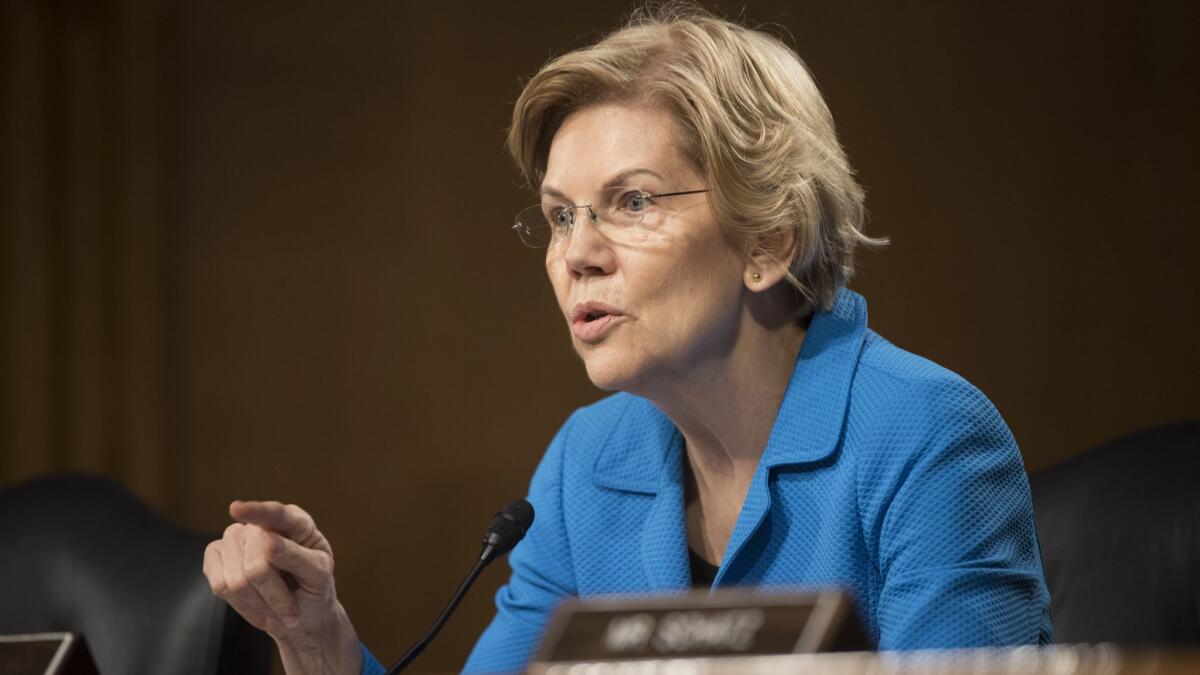Column: Elizabeth Warren demands investigation of Interior nominee’s alleged conflicts

- Share via
From the moment that President Trump nominated David Bernhardt to the No. 2 job at the Interior Department, it was clear that Bernhardt would come trailing clouds of conflicts of interest.
Now Trump has nominated Bernhardt to be the top guy at Interior, succeeding the ethically-challenged former Secretary Ryan Zinke. Sens. Elizabeth Warren (D-Mass.) and Richard Blumenthal (D-Conn.) on Wednesday shot off letters to the agency’s ethics officers demanding an investigation of allegations that Bernhardt has lived down to his critics’ expectations of favors done for his former law clients.
It’s a timely demand; Bernhardt’s confirmation hearing hasn’t yet been scheduled, but it’s imminent. He’s been serving as acting secretary since last month.
As the acting head of a major government agency, it is incumbent upon Mr. Bernhardt to be held to the highest standards of ethical conduct.
— Sens. Elizabeth Warren and Richard Blumenthal
The senators cited, among other things, Bernhardt’s “opportunity to oversee Interior policies that directly affected his former clients, who paid his firm millions to lobby on their behalf.”
Among those clients is the vast Westlands Water District in California’s Central Valley. As my colleague Bettina Boxall reported way back in May 2017, Bernhardt sued Interior four times on behalf of Westlands Water District, the nation’s largest irrigation district — personally arguing one appeals case challenging endangered species protections for imperiled California salmon.
After taking office as deputy secretary, Bernhardt set right in with attempts to undermine the Endangered Species Act, as we reported in August.
Shortly after his confirmation in 2017, Bernhardt submitted a list of 22 individuals and entities on whose cases he would have to recuse himself at Interior through mid-2018, typically because they were former clients at his former law firm Brownstein Hyatt Farber Schreck, which represents companies in the oil, gas, mining and agriculture industries.
Yet environmentalists in the Midwest have alleged in a lawsuit that many of these former clients “began receiving sudden and dramatic windfalls only months since his swearing-in” as deputy.
One former client is Cadiz Inc., the developer of a putative water storage project in the Mojave Desert that paid the Brownstein firm $2.75 million in lobbying fees and 200,000 shares of stock while Bernhardt was at the firm; Scott Slater, a Brownstein attorney, currently serves as the Cadiz CEO. Within months of Bernhardt’s confirmation, Interior withdrew legal rulings adverse to Cadiz, giving the water project a new lease on life despite years of findings that it’s essentially useless and environmentally damaging.
The Independent Petroleum Assn. of America, another outfit on Bernhardt’s list, benefited when Interior took steps to revise government agreements protecting the sage grouse. Did Bernhardt have a hand in this action? The IPAA certainly seems to think so. In March it joined nine other oil and gas industry groups to thank Bernhardt personally.
Then there’s the Shasta Dam project. The Trump administration has been pushing hard for an enlargement of the Northern California dam despite the opposition of state officials and state law prohibiting the project. The expansion would come under the jurisdiction of the federal Bureau of Reclamation, which is part of Interior and therefore within Bernhardt’s authority. Who would this project benefit? Big water districts, notably Bernhardt’s former client, Westlands.
In their letter to Mary Kendall, the deputy inspector general at Interior, Warren and Blumenthal asked for an internal investigation of the role Bernhardt played in decisions affecting Westlands and whether he has complied with government rules on ethical conflicts in connection with the water district or any other ex-clients.
They sent a similar letter to Scott de la Vega, Interior’s designated ethics official, asking for copies of ethics determinations the agency has made about Bernhardt’s activities and for information about waivers he received allowing him to participate in meetings on topics that should be covered by his recusals.
In both letters, the senators noted that “as the acting head of a major government agency, it is incumbent upon Mr. Bernhardt to be held to the highest standards of ethical conduct and to avoid any appearance of impropriety.”
Obviously, this is all information the public needs to know. Even more, the Senate needs to know before it votes on Bernhardt’s appointment. As we’ve observed, the Trump Cabinet has been filling up on industry lobbyists appointed to oversee their former clients. Bringing all these connections into the open is long overdue, and Bernhardt’s tenure at Interior is a good place to start.
Keep up to date with Michael Hiltzik. Follow @hiltzikm on Twitter, see his Facebook page, or email michael.hiltzik@latimes.com.
Return to Michael Hiltzik’s blog.
More to Read
Sign up for Essential California
The most important California stories and recommendations in your inbox every morning.
You may occasionally receive promotional content from the Los Angeles Times.











